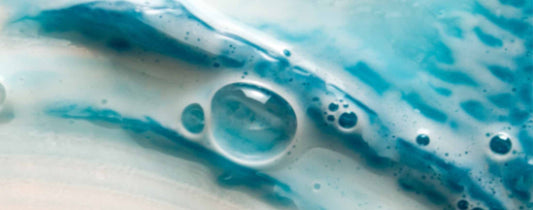We don’t have to tell you that vitamin C is beneficial to your health. And unless you've been living under a rock, you know that it's a hot ingredient in skincare recently. But what's all the fuss about?
Simply put, vitamin C promotes clear, youthful, glowing skin. Who doesn't want that? Here's our guide to how and why vitamin C can provide all those benefits, and why you don’t want to miss out on this active ingredient!

The Top 5 Skin Benefits of Vitamin C
Sun Protection
More relevant than ever during the summer months, we are constantly reminded to wear sunscreen to protect ourselves from the sun’s harmful ultraviolet rays. But simply applying sunscreen every day is not good enough. To get the most out of your sunscreen and truly protect your skin, you should be pairing it with a powerful antioxidant like vitamin C.
Vitamin C does not work as a barrier to UV rays, but rather a potent antioxidant once rays enter the skin. UV rays cause the release of damaging free radicals, which lead to premature signs of aging. However, vitamin C neutralizes these free radicals, thus shielding your skin from the damage they can cause. This leaves you with a healthy and vibrant complexion instead of skin that’s been victimized by the sun.
UV rays cause the release of damaging free radicals, which lead to premature signs of aging.
In serums, vitamin C has been shown to enhance the function of sunscreens, reducing the incidence of sunburns and increasing the SPF’s stability. So if you want to beat the burn this summer, you should strongly consider investing in a vitamin C serum!
Lightening Dark Spots
If you suffer from an uneven skintone, sun spots, or post-inflammatory hyperpigmentation from acne, sun spots, or an uneven skin tone, then a vitamin C serum could be a key part of the solution to your skin concerns!
In addition to causing premature aging, free radicals are also culprits for skin darkening. As mentioned above, vitamin C is an antioxidant that fends off the production of these free radicals. In this case, vitamin C’s ability to fight free radicals makes it an excellent active ingredient to prevent the darkening of areas of the skin and even out your complexion.
Yet again, free radicals are to blame for your biggest skin complaints.
Applying vitamin C topically also helps reverse sun damage for skin that’s had too much sun exposure. Vitamin C acts as a mild exfoliant, getting rid of dead skin cells that contain melanin. Melanin is the portion of your skin that helps determine how much pigment is present, and therefore contributes to color. By getting rid of these dead cells, vitamin C helps to regulate and normalize melanin production. This in turn evens out the color, helping the skin become smoother and lighter. Good riddance, sun spots!
Treating Acne
Most of us know that acne involves a nasty bacteria, p. acnes. But did you know that susceptibility to infection by this acne-causing bacteria can be traced back to free radical damage? Yet again, free radicals are to blame for your biggest skin complaints.
Free radicals break down the proteins and fatty acids that make up the epidermis, disturbing the normal pH of the skin and damaging the sebaceous glands, which produce oil. This increases the production of sebum (oil), which leaves the skin open to breakout-causing bacteria. Thankfully, vitamin C works to clear out those harmful toxins. Its antioxidant power breaks down the free radicals before they can leave your skin with painful pimples.
Reducing Inflammation
Many skin conditions have some inflammatory component to them. Whether it’s acne, sun damage, or rosacea, inflammation is unfortunately often present.
Vitamin C helps reduce the redness, inflammation, and oftentimes irritation associated with many skin conditions. Numerous studies show that vitamin C has inflammation-reducing qualities. This is partly because vitamin C improves the skin’s ability to heal itself, thus expediting the healing of wounds caused by these skin conditions.
Vitamin C’s anti-inflammatory properties are also ideal for people who have sensitive skin. If you are among those that tend to experience stinging, redness, or dryness, especially after washing your face, then a vitamin C serum can go a long way in helping soothe your skin!
Increasing Collagen and Elastin Production
Healthy collagen and elastin are anti-aging essentials — they maintain the structure and elasticity of your skin. Elastin gets its name from “elastic,” meaning it allows your skin to stretch and bounce back. Collagen is what helps give your skin strength. Simply put, it is the “glue” that helps hold the body together.
Applying vitamin C topically helps preserve and enhance collagen and elastin production.
Collagen and elastin keep the skin tight, full, plump, and wrinkle-free. So when they naturally begin to decrease with age and stress, your skin inevitably suffers. That’s where vitamin C comes into play. Applying vitamin C topically helps preserve and enhance collagen and elastin production, helping your skin keep its vibrant and youthful look.
The Different Types of Vitamin C
Ascorbic Acid
This type of vitamin C is sometimes referred to as “synthetic vitamin C,” and is often warned against. It is also deemed the most powerful form of vitamin C, which can be misconstrued, because most powerful does not always equate to most beneficial.
Ascorbic acid can be an irritant and actually cause acne.
Ascorbic acid can be an irritant and actually cause acne. Seems counterintuitive, right? It degrades quickly, oxidizing when it makes contact with light, air, and water. If you’ve ever had a vitamin C serum that turned orange or brown, it’s because the ascorbic acid in it oxidized and was no longer stable. Studies over the last several years have even demonstrated that people who use high doses of ascorbic acid may actually be putting themselves at risk for a number of health challenges.
Magnesium Ascorbyl Phosphate
Thankfully, ascorbic acid is not the only form of vitamin C out there. Magnesium ascorbyl phosphate (MAP) is a naturally occurring water-soluble derivative of vitamin C, and in many opinions, a much more superior form.
As a very stable form of vitamin C, MAP is able to release the powerful antioxidant effects that we love about vitamin C into the skin. This type of vitamin C is considered more gentle than others, although it is still a highly effective way to treat numerous skin concerns. Win-win!
MAP is a naturally occurring water-soluble derivative of vitamin C, and in many opinions, a highly superior form.
Squeezing The Most Out Of It
To reap the full benefits of a vitamin C serum, we recommend buying one that uses one of the more stable forms of vitamin C — like MAP — and avoiding those that use ascorbic acid (which may also be listed as l-ascorbic acid on the ingredients panel).







